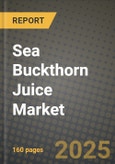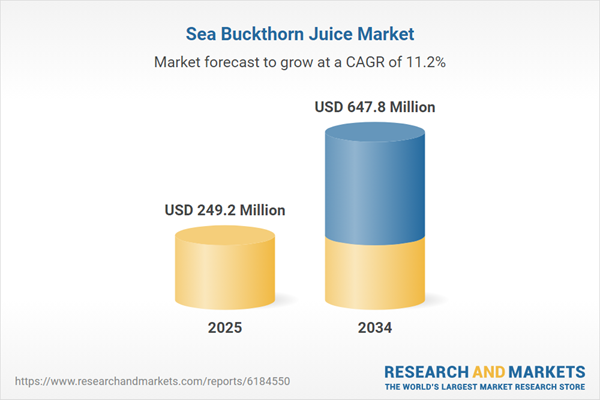Sea Buckthorn Juice Market
The Sea Buckthorn Juice Market is evolving from a niche superfruit category into a structured functional-beverage space anchored in clean-label nutrition and botanical efficacy. Extracted from Hippophae rhamnoides berries rich in vitamin C, carotenoids, flavonoids, and omega-7, sea buckthorn juice is positioned for immune support, skin health, metabolism, and general wellness. Top applications span ready-to-drink shots, smoothie bases, wellness blends with ginger/turmeric/acerola, and B2B use as a high-potency concentrate in functional beverages, nutraceutical tonics, and premium foodservice menus. Current trends include organic and wild-crafted sourcing, NFC (not-from-concentrate) positioning, low-sugar formulations, adaptogen/herbal co-formulations, and e-commerce-led discovery via D2C brands. Growth is driven by consumer interest in botanical actives, expanding cultivation in cold/arid regions, improved de-astringency processing, and premium glass/aseptic packaging that preserves color and bioactives. The competitive landscape features a blend of vertically integrated orchard processors, specialty beverage brands, and nutraceutical suppliers, with increasing private-label activity by natural retailers. Strategic priorities include stabilizing sensory profiles across harvest lots, developing claim-compliant communication, and building supply resilience through agronomy and long-term sourcing contracts. Route-to-market is omni-channel: natural/specialty retail, online subscriptions, and targeted HoReCa/health clinics. Over the forecast horizon, category depth will be defined by standardized concentrates, flavor-forward blends to broaden palates, sustainability storytelling around hardy, soil-restoring shrubs, and partnerships between growers, extractors, and functional beverage innovators.Sea Buckthorn Juice Market Key Insights
- Formats & Processing: NFC juices, clarified/pulp-rich styles, and standardized concentrates dominate, with cold-pressed and HPP options improving freshness cues. De-astringency, enzymatic clarification, and low-temperature pasteurization are critical to manage acidity and preserve carotenoids and omega-7 integrity across SKUs.
- Positioning & Claims: Core value propositions cluster around immunity, skin radiance, and metabolic wellness. Brands increasingly favor “food-as-medicine” narratives and beauty-from-within crossovers, while maintaining conservative language to align with labeling rules across regions and sales channels.
- Blending Strategies: Flavor balancing with apple, pear, orange, mango, and ginger/turmeric improves repeat purchase. Co-formulations with collagen, hyaluronic acid, probiotics, and adaptogens create laddered price points and expand usage into daily routines beyond seasonal immunity spikes.
- Packaging & Shelf Life: Amber glass and aseptic cartons help protect light-sensitive carotenoids. Smaller shot formats and portion-controlled PET enable premium price realization, trial, and subscription replenishment, while capex in aseptic lines underpins quality consistency.
- Supply & Agronomy: Sourcing is diversifying from historical European and Chinese hubs to emerging Himalayan and Central Asian orchards. Investments in cultivar selection, irrigation efficiency, and harvesting mechanization support year-round B2B supply for beverage and nutraceutical clients.
- Sensory Management: Natural tartness and pectin levels require targeted sweetening, mouthfeel optimization, and flavor modulation. Brands that master acidity control without masking the botanical profile see stronger retention and broader household penetration.
- Route-to-Market: E-commerce and subscription bundles drive discovery and education; natural/specialty retail anchors credibility; clinics/spas open beauty-nutrition cross-sell. Foodservice adoption grows via smoothies and wellness shots in premium cafés and hotel wellness programs.
- Regulatory & Quality: Success hinges on contaminant testing, pesticide residue controls for organic claims, and lot-to-lot standardization of key markers (vitamin C, carotenoids, palmitoleic acid). Documentation depth is a differentiator for B2B buyers and private-label tenders.
- Competitive Dynamics: Category leaders pair orchard ownership or long-term grower contracts with in-house extraction and blending. Fast-followers leverage flexible co-packing, limited editions, and retailer exclusives; ingredient suppliers move upstream into branded consumer lines.
- Sustainability & Storytelling: The shrub’s drought/cold hardiness and soil-stabilizing roots support credible regeneration narratives. Traceability, fair grower pricing, and low-waste processing (seed oil valorization) strengthen retailer acceptance and premium positioning.
Sea Buckthorn Juice Market Reginal Analysis
North America
Adoption is propelled by clean-label and beauty-nutrition trends, with consumers receptive to shot formats and smoothie blends through natural retailers and specialty e-commerce. Education on taste and usage frequency remains vital; brands lean on sampling, bundle deals, and influencer-led wellness routines. Co-manufacturing capacity and aseptic tolling support agile launches, while compliant claim language and transparent testing underpin retail expansion. Foodservice trials in premium cafés and boutique gyms broaden usage occasions across urban wellness hubs.Europe
A mature base of cultivation and processing - especially in Northern and Eastern sub-regions - supports a stable ingredient supply for both branded and private-label juices. Organic certification, provenance stories, and glass packaging resonate with sustainability-driven consumers. Retailers emphasize standardized concentrates for consistent flavor across seasons. Regulatory discipline on health messaging shapes conservative front-of-pack claims, encouraging brands to spotlight sensorial quality, culinary versatility, and beauty-from-within pairings with collagen or herbal tonics.Asia-Pacific
Large-scale cultivation and long-standing traditional usage underpin strong B2B availability and diverse product concepts. Mainland markets integrate sea buckthorn in TCM-inspired beverages; Northeast Asia connects juice with dermocosmetic routines; Australasia sees niche growth through specialty health chains and online subscriptions. Manufacturers invest in cultivar selection and low-temperature processing to stabilize color and nutrient markers, while cross-border e-commerce accelerates premium brand diffusion and seasonal gift pack opportunities.Middle East & Africa
Demand concentrates in premium urban channels - health stores, pharmacies, and upscale supermarkets - where immunity and beauty halos justify smaller-format shots. Import reliance encourages partnerships with European/Asian processors for standardized concentrates tailored to local taste profiles. Halal certification, heat-stable formulations for ambient conditions, and glass-to-aseptic packaging choices are practical differentiators. Wellness tourism, hotel cafés, and spa retail create on-premise trial that feeds into online replenishment.South & Central America
Early-stage consumer awareness creates room for premium education-led positioning in specialty retailers and online platforms. Local R&D explores adaptability of shrubs in cooler highland microclimates, while brands initially depend on imported concentrates. Flavor bridges with tropical fruits help acclimate palates; cafés and juice bars offer first-contact experiences via smoothies and wellness shots. Partnerships with natural chains and dermatology-adjacent boutiques foster beauty-nutrition cross-sell and repeat purchase.Sea Buckthorn Juice Market Segmentation
By Type
- With Sugar
- Without Sugar
By Application
- Retailer
- Food Service
Key Market players
Erbology, Leh Berry, Sanddorn GmbH Herzberg, Sanddorn Storchennest GmbH, Rabenhorst, Biotta, Biotona, Cornish Seaberry Company, Seabuckthorn Scotland CIC, Wild and Scottish, Coeur Sauvage, Premium Rosa, Nasza Tłocznia, NFC Juices, Pressuice, Weleda, Christine Berger GmbH (Sanddorn Christine Berger), Vi Nature, Bio Naturo, EkaMedica.Sea Buckthorn Juice Market Analytics
The report employs rigorous tools, including Porter’s Five Forces, value chain mapping, and scenario-based modelling, to assess supply-demand dynamics. Cross-sector influences from parent, derived, and substitute markets are evaluated to identify risks and opportunities. Trade and pricing analytics provide an up-to-date view of international flows, including leading exporters, importers, and regional price trends.Macroeconomic indicators, policy frameworks such as carbon pricing and energy security strategies, and evolving consumer behaviour are considered in forecasting scenarios. Recent deal flows, partnerships, and technology innovations are incorporated to assess their impact on future market performance.
Sea Buckthorn Juice Market Competitive Intelligence
The competitive landscape is mapped through proprietary frameworks, profiling leading companies with details on business models, product portfolios, financial performance, and strategic initiatives. Key developments such as mergers & acquisitions, technology collaborations, investment inflows, and regional expansions are analyzed for their competitive impact. The report also identifies emerging players and innovative startups contributing to market disruption.Regional insights highlight the most promising investment destinations, regulatory landscapes, and evolving partnerships across energy and industrial corridors.
Countries Covered
- North America - Sea Buckthorn Juice market data and outlook to 2034
- United States
- Canada
- Mexico
- Europe - Sea Buckthorn Juice market data and outlook to 2034
- Germany
- United Kingdom
- France
- Italy
- Spain
- BeNeLux
- Russia
- Sweden
- Asia-Pacific - Sea Buckthorn Juice market data and outlook to 2034
- China
- Japan
- India
- South Korea
- Australia
- Indonesia
- Malaysia
- Vietnam
- Middle East and Africa - Sea Buckthorn Juice market data and outlook to 2034
- Saudi Arabia
- South Africa
- Iran
- UAE
- Egypt
- South and Central America - Sea Buckthorn Juice market data and outlook to 2034
- Brazil
- Argentina
- Chile
- Peru
Research Methodology
This study combines primary inputs from industry experts across the Sea Buckthorn Juice value chain with secondary data from associations, government publications, trade databases, and company disclosures. Proprietary modeling techniques, including data triangulation, statistical correlation, and scenario planning, are applied to deliver reliable market sizing and forecasting.Key Questions Addressed
- What is the current and forecast market size of the Sea Buckthorn Juice industry at global, regional, and country levels?
- Which types, applications, and technologies present the highest growth potential?
- How are supply chains adapting to geopolitical and economic shocks?
- What role do policy frameworks, trade flows, and sustainability targets play in shaping demand?
- Who are the leading players, and how are their strategies evolving in the face of global uncertainty?
- Which regional “hotspots” and customer segments will outpace the market, and what go-to-market and partnership models best support entry and expansion?
- Where are the most investable opportunities - across technology roadmaps, sustainability-linked innovation, and M&A - and what is the best segment to invest over the next 3-5 years?
Your Key Takeaways from the Sea Buckthorn Juice Market Report
- Global Sea Buckthorn Juice market size and growth projections (CAGR), 2024-2034
- Impact of Russia-Ukraine, Israel-Palestine, and Hamas conflicts on Sea Buckthorn Juice trade, costs, and supply chains
- Sea Buckthorn Juice market size, share, and outlook across 5 regions and 27 countries, 2023-2034
- Sea Buckthorn Juice market size, CAGR, and market share of key products, applications, and end-user verticals, 2023-2034
- Short- and long-term Sea Buckthorn Juice market trends, drivers, restraints, and opportunities
- Porter’s Five Forces analysis, technological developments, and Sea Buckthorn Juice supply chain analysis
- Sea Buckthorn Juice trade analysis, Sea Buckthorn Juice market price analysis, and Sea Buckthorn Juice supply/demand dynamics
- Profiles of 5 leading companies - overview, key strategies, financials, and products
- Latest Sea Buckthorn Juice market news and developments
Additional Support
With the purchase of this report, you will receive:- An updated PDF report and an MS Excel data workbook containing all market tables and figures for easy analysis.
- 7-day post-sale analyst support for clarifications and in-scope supplementary data, ensuring the deliverable aligns precisely with your requirements.
- Complimentary report update to incorporate the latest available data and the impact of recent market developments.
This product will be delivered within 1-3 business days.
Table of Contents
Companies Mentioned
- Erbology
- Leh Berry
- Sanddorn GmbH Herzberg
- Sanddorn Storchennest GmbH
- Rabenhorst
- Biotta
- Biotona
- Cornish Seaberry Company
- Seabuckthorn Scotland CIC
- Wild and Scottish
- Coeur Sauvage
- Premium Rosa
- Nasza Tłocznia
- NFC Juices
- Pressuice
- Weleda
- Christine Berger GmbH (Sanddorn Christine Berger)
- Vi Nature
- Bio Naturo
- EkaMedica.
Table Information
| Report Attribute | Details |
|---|---|
| No. of Pages | 160 |
| Published | November 2025 |
| Forecast Period | 2025 - 2034 |
| Estimated Market Value ( USD | $ 249.2 Million |
| Forecasted Market Value ( USD | $ 647.8 Million |
| Compound Annual Growth Rate | 11.2% |
| Regions Covered | Global |
| No. of Companies Mentioned | 20 |









